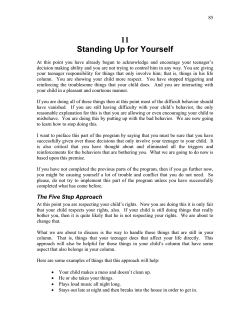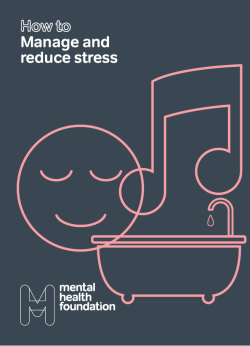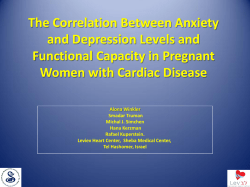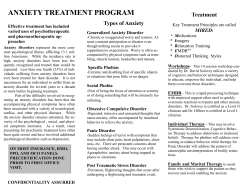
How to prevent depression and clinical anxiety in your teenager
How to prevent depression and clinical anxiety in your teenager Strategies for parents There is a range of factors that influence whether or not a teenager develops depression or clinical anxiety, including a few which parents have some control over. This means there are things you can do to help reduce your teenager’s risk of developing these problems. The last two editions of the Bulletin shared information on depression and clinical anxiety, and outlined practical parenting strategies as recommended by Beyond Blue. Below outlines some more suggestions. Make sure you look at the next Bulletin for information on how to get help. Strategy 6 Encourage good health habits Encourage your teenager to have good health habits around diet, exercise, sleep and drug use, as this reduces their risk of developing depression and clinical anxiety. • Diet – Make sure that your teenager has a healthy balanced diet and limit the amount of unhealthy food and drinks in the family home. • Exercise – Encourage your teenager to get daily physical exercise. If they are not interested in sports, encourage them to find other opportunities for physical activity such as dancing, walking to school or walking the dog. • Sleep – Young people can reduce their risk of developing depression and clinical anxiety by getting adequate sleep each night. Encourage your teenager to practise good sleep hygiene, particularly if they have trouble sleeping (See box below: How to practise good sleep hygiene). • Drug use – Teenagers who are anxious or depressed are more likely to use alcohol and other drugs. If you find out that your teenager is using alcohol or other drugs, you should discuss with them why they are using these substances and seek help if needed. HOW TO PRACTISE GOOD SLEEP HYGIENE ‘Sleep hygiene’ refers to habits that help you have a good night’s sleep. Encourage your teenager to: • go to bed and get up at the same time each day (even on weekends) • wind down with relaxing activities before bedtime • be mindful of their caffeine intake late in the day • get out of bed and do something in another room if they can’t sleep. They should go back to bed when they’re feeling drowsy. • keep their bedroom quiet and at a comfortable temperature • not read or watch TV in bed • not nap during the day no matter how tired they feel. Strategy 7 Help your teenager to deal with problems Learning to deal well with problems can help reduce a teenager’s risk of developing depression and clinical anxiety. Try to demonstrate effective problem‐solving approaches for your teenager and teach problem‐solving strategies by working through real life problems together. When your teenager is faced with problems: • Ask them what they need from you (e.g. whether they just want you to listen or to offer advice). Give your teenager time to talk through the problem before offering to discuss solutions. Do not try to solve all their problems for them. • • Help them break down potential challenges into smaller steps that are manageable. • Encourage your teenager to consider the effects of their actions on other people. Encourage your teenager by reminding them of times in the past when they have dealt well with problems. • Praise your teenager when they deal well with problems. Recognise and encourage their problem‐ solving efforts, rather than focusing on the outcomes. Sometimes your teenager will be unsuccessful in their attempts to solve a problem, even with your help. In such circumstances, encourage them to not give up and to try another approach. Encourage your teenager to take responsibility for things that go wrong if it is their fault and help them to learn from their failures. Support your teenager in dealing with stress It is important for your teenager to learn how to manage stress effectively. Learn some effective strategies for managing stress and use them to set an example for your teenager about how to cope well with stressful situations and setbacks. Pay attention to your teenager’s behaviour for indications that they may not be coping well with stress. Help your teenager learn effective ways to deal with their negative emotions. For example, by talking about their negative feelings with someone they trust. If your teenager is unable to recover from stressful experiences, get help for them from a mental health professional. Help your teenager to deal with pressure and expectations Often teenagers feel pressure to live up to their own expectations of themselves as well as expectations from a number of other sources, such as family, friends, school and society. Excessive parental pressure to achieve or perform can increase a teenager’s risk of developing depression and clinical anxiety. Although it is important to have positive expectations for your teenager and their future, try to match your expectations to their individual personality and capabilities. Young people can also be subjected to pressure and expectations from the media. Discuss with your teenager the messages that they receive through media which can shape their values, perceptions and expectations about life. For example, the expectation that girls should be thin and sexy, and boys should be handsome and tough. Help your teenager deal with problems at school If your teenager feels safe at school and has good relationships with other students and teachers, they are at a lower risk of developing depression and clinical anxiety. However, school can sometimes be a source of problems for young people. When this is the case, you will need to help your teenager deal with these problems. Bullying Being a victim of bullying increases a teenager’s risk of developing depression and clinical anxiety. Bullying refers to repeated and intentional use of words or actions against someone or a group of people to cause distress and risk to their wellbeing. It can be verbal, physical, social, psychological, or occur online (i.e. cyberbullying). Become familiar with the school’s anti‐bullying policy or encourage the development of one if it doesn’t already exist. If your teenager is the victim of bullying, avoid minimising the situation. Never blame the victim for being bullied. Discuss with your teenager how they would like to deal with the bullying. School refusal Teenagers may avoid going to school as the result of depression and clinical anxiety. If your teenager is avoiding school, discuss with them why and work out a solution together. Get professional advice and support if your teenager continues to avoid school. Strategy 8 Help your teenager to deal with anxiety Help your teenager to learn about anxiety Ensure that your teenager is aware that all young people experience some anxiety. Normal anxiety is useful, as it helps us prepare for real danger or perform at our best. However, anxiety can become a problem if it is severe, long‐lasting, and interferes with your teenager’s studies, other activities, and family and social relationships. Clinical anxiety is common in young people, affecting 1 in 25 teenagers in any 12‐month period. Help your teenager to manage anxiety so that it doesn’t become a problem It’s important for your teenager to manage everyday anxiety appropriately so that it doesn’t develop into clinical anxiety. Help them understand the importance of tackling situations that they find anxiety provoking. Exposure to anxiety provoking situations is one of the most effective ways of reducing clinical anxiety. If a teenager avoids things that cause them anxiety, their anxiety is unlikely to reduce, and in fact may increase. However, it is important to be confident that your teenager is capable of handling an anxiety‐ provoking situation before encouraging them to tackle it. For example, it may not be helpful to encourage your teenager to enter a singing contest if they are not yet comfortable singing in front of the family. Reward or praise your teenager when they take steps to manage their anxiety. Tell them that you are proud of their ability to act in the face of considerable anxiety. Also, encourage your teenager to reward or praise themselves whenever they tackle a situation that they find anxiety provoking. If you fnd yourself becoming impatient with your teenager’s anxiety, remind yourself of how daunting it can be to face one’s fears. Be a good role model in dealing with anxiety The way you respond to your teenager’s anxiety may inadvertently maintain their anxiety. Teenagers can learn to be anxious by observing their parent’s anxious behaviour. If you are highly anxious yourself, you should set a good example for your child by showing them how you actively use strategies to address your own anxiety. When helping your teenager to manage their anxiety, you should also try to separate your own anxieties from theirs. Try to maintain a calm and relaxed manner when talking to your teenager about their anxiety.
© Copyright 2025









